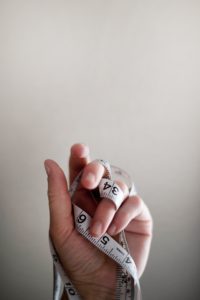 #LoseHateNotWeight
#LoseHateNotWeight
If you are a woman living in the U.S., odds are good that you, like me, have attempted to lose weight in the New Year at some point in life. Perhaps even most years of life. Very possibly, you spent the last two months eating Halloween candy, Thanksgiving leftovers, Christmas cookies, and other holiday treats. All the while, you felt a tinge of guilt and shame about your food choices. You heard the external and internal message that you were being bad, but when the New Year begins, you can be “good” and lose weight. But perhaps you know deep down this diet will only last so long, and you’ll find yourself back in the cycle again, more dissatisfied than ever.
How do I know this? Because diet culture, body dissatisfaction, and fat-shame is the air we breath in our world. We are bombarded with messages of what body types are best, and that weight gain is bad, even sinful or life-threatening. With language like “obesity epidemic” frequent in our media, we may fear that weight gain makes us part of this health crisis. Women in particular can become enslaved in the “yo-yo dieting” cycle, which is correlated with body hatred and reduced health. Many of us have bought the promise that at a certain size we will be okay, but until then we are less than adequate. Even the new wave of “clean-eating” messaging is old diet-culture with a face lift, categorizing food into rigid “good” and “bad” lists. Unfortunately, children often adopt these messages early on, learning to link their value with food and weight.
Hopping Off The Weight-Loss Train
In my own journey of hopping off the New Year weight-loss train, there are three truths that I’ve come to believe. I hope you’ll consider them and explore the resources I’m sharing as well — don’t just take my word for it! Have conversations about this with the women in your life. You are NOT alone in this struggle. Women have been socialized to trash-talk our bodies to one another for so long. Maybe it’s time for us to change the conversation.
1. BMI is a faulty measurement of health.
BMI (body mass index) is a system based on researching a few and applying the findings to the masses (thanks largely to insurance companies, not medical professionals!). The truth is, weight change is often not a marker of health and well-being, and health can be achieved at a range of sizes. I don’t use language like “overweight,” “underweight,” or “obese” any longer because I know they aren’t based in reality. For more on the history or science on this topic, check out the video Poodle Science, the book Health At Every Size, or the HAES website.
2. “Our bodies are not nearly as judgmental of our food choices as we are.” (Jessica-Lauren Newby MS, RD, CEDRD).
Paying attention to food allergies, sensitivities, and preferences is important for health. There are multiple foods, some considered “healthy,” on my own do-not-eat list because they cause digestive issues for me, particularly postpartum, or I just don’t like them. Some foods I limit for environmental and social justice reasons. However, we are neither being good nor bad when we make choices about what to eat. We are simply being human! While foods may vary in nutritional content and health benefits, in general it would help us all to view food choice in a more neutral way. I try to practice the belief that the only connection between food and morality is whether or not it has origins that honor the well-being of the earth and the people providing it. Otherwise, food is food. I really love this article on the topic, as well as the Center for Mindful Eating.
3. Loving myself and listening to and honoring my body’s wants and needs are more lasting and
effective ways of achieving health and wellness.
Self-loathing, criticizing, and restricting are likely better predictors of decreased life satisfaction and life expectancy than weight or BMI. I can’t listen to my body and honor its needs when I’m constantly rejecting it. The cultural message that I will be valuable when my body looks a certain way is a diet-culture money-making lie. I am choosing to practice loving my body as-is. For more information on developing a kinder relationship with your body, check out The Body Positive and their book Embody.
A New Intention This New Year
What better New Year intention could we set than choosing to love ourselves more than we criticize and judge ourselves? Contrary to what some may argue, these beliefs help me treat my body more like a temple than ever before. As someone who has to work to hold on to these truths, I know this is a difficult change. And for people dealing with disordered eating or body dysmorphia, it can feel downright impossible. But changing the way we relate to ourselves is possible! If the idea of loving your body “as-is” feels inconceivable, perhaps consider seeking a weight-neutral professional (i.e. therapist, dietitian, or life coach) to assist you in this journey. You and your body are worth it.












